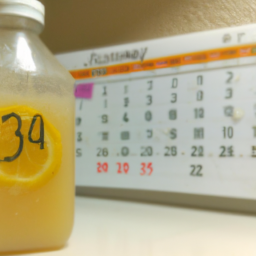As a fan of cooking and baking, I always have a bottle of commercial lemon juice in my fridge. But I often wonder, what is the expiration date of commercial lemon juice?
It’s important to know the answer to this question to ensure that the lemon juice you’re using is still safe to consume and won’t negatively impact the taste of your dishes.
The shelf life of store-bought lemon juice can vary based on a number of factors, including the type of packaging, storage conditions, and preservatives used. In this article, we’ll explore these factors in depth and provide you with tips on how to properly store your lemon juice to extend its shelf life.
We’ll also discuss the health risks associated with consuming spoiled lemon juice and the benefits of using fresh lemons.
So, let’s dive in and answer the question: how long does store-bought lemon juice last?
Key Takeaways
- Store-bought lemon juice can last up to 6 months in an airtight container in the fridge, and proper storage techniques can extend shelf life.
- Factors affecting shelf life include packaging, storage conditions, and preservatives used, with glass bottles preferred over plastic containers.
- Signs of spoiled lemon juice include foul smell and change in color, and consuming spoiled lemon juice can lead to gastrointestinal problems and food poisoning.
- Fresh lemon juice is recommended for best taste and quality, and using it enhances flavor and nutritional value in various dishes, cocktails, and marinades.
Factors Affecting the Shelf Life of Store-Bought Lemon Juice
You may be wondering how long your store-bought lemon juice will last, but did you know that factors like storage conditions and preservatives can greatly affect its shelf stability?
Lemon juice that is packaged in an airtight container and stored in the refrigerator can last for up to six months. However, if the container is not airtight or the juice is exposed to light or heat, it can spoil much sooner.
Packaging materials also play a role in the shelf life of store-bought lemon juice. Glass bottles are preferred over plastic containers because they’re less likely to leach chemicals into the juice. Additionally, bottles with a dark tint can protect the juice from light exposure, which can cause it to spoil faster.
Understanding these factors can help you make informed decisions about how long to keep your store-bought lemon juice before it expires.
Understanding Expiration Dates
Imagine opening your fridge to find a container of sour, moldy liquid that once promised to add a tangy kick to your dishes – all because you didn’t pay attention to the expiration date. Understanding expiration dates is crucial in ensuring that the store-bought lemon juice you buy stays fresh for longer.
Here are some key points to keep in mind:
- Expiration dates are not suggestions; they’re a clear indication of when the product isn’t safe to consume.
- The expiration date on a product is based on the date the product was manufactured, so it’s important to check the date before purchasing.
- Proper storage techniques can extend the shelf life of the lemon juice. For instance, refrigerating the juice after opening can help it stay fresh for longer.
- It’s important to note that the expiration date only applies to unopened containers. Once opened, the lemon juice may not be safe to consume after the indicated expiration date.
- If you’re unsure about the expiration date, it’s always better to err on the side of caution and dispose of the product.
Understanding expiration dates and implementing proper storage techniques can help you avoid the disappointment of throwing out spoiled lemon juice. However, if you’ve missed the expiration date and are unsure if the lemon juice has gone bad, there are signs to look out for.
Signs of Spoiled Lemon Juice
When opening a container of expired lemon juice, you’ll notice a foul smell and a change in color from bright yellow to a dark, murky hue. These are clear signs that the lemon juice has gone bad and should not be consumed.
The off flavors and color changes indicate that the lemon juice has started to decompose, leading to the formation of harmful compounds that could pose potential health hazards. Consuming spoiled lemon juice could lead to gastrointestinal problems such as cramps, diarrhea, and vomiting. In severe cases, it could even cause food poisoning.
Therefore, it’s essential to check the expiration dates on the lemon juice before consuming it. In addition, proper storage techniques can help extend the shelf life of lemon juice.
Proper Storage Techniques
To keep your citrus concoction fresh for future consumption, try placing the pitcher of lemonade in the fridge and covering it with a clingy cover. Proper storage is crucial in extending the shelf life of store-bought lemon juice. Here are some tips to maintain the freshness of your lemon juice:
-
Store the unopened bottle in a cool, dark place with a temperature between 40°F to 50°F. Avoid storing it near heat sources such as stoves or ovens.
-
Once opened, transfer the lemon juice to a clean, airtight container and keep it in the fridge. The temperature should be between 33°F to 40°F.
-
Use a container made of glass or plastic, as these materials do not react with the acid in the lemon juice. Avoid using metal containers as they can cause a metallic taste and discoloration.
-
Do not mix the lemon juice with other liquids, as this can cause bacteria growth and affect the quality of the juice.
-
Check the expiration date on the bottle and use the lemon juice before it expires.
By following these proper storage techniques, you can extend the shelf life of your lemon juice and enjoy its tangy flavor for a longer time.
In the next section, we’ll discuss tips for extending the shelf life of lemon juice beyond the expiration date.
Tips for Extending Shelf Life
To extend the shelf life of lemon juice, I always add preservatives such as citric acid or ascorbic acid.
Another tip is to use fresh lemons instead of store-bought juice since it contains preservatives that can affect the taste and quality of the juice.
I also make sure to practice proper hygiene when handling the lemons and the juice to avoid contamination and spoilage.
Adding Preservatives
If you’re looking to extend the shelf life of your store-bought lemon juice, adding preservatives is a viable option. Many store-bought lemon juices come with preservatives already included, but if not, you can add them yourself.
Common preservatives include ascorbic acid, citric acid, and sodium benzoate. Ascorbic acid and citric acid help to prevent oxidation and extend shelf life, while sodium benzoate is a common antimicrobial preservative.
It’s important to note that adding preservatives to store-bought lemon juice may affect its taste and overall quality. Preservative-free options may be preferred by those who value the taste and health benefits of fresh lemon juice.
If you’re looking to use fresh lemons instead of store-bought lemon juice, read on for more tips on how to make the most of your fresh citrus.
Using Fresh Lemons
Savor the bright, tangy flavor of freshly squeezed lemons in your recipes by following these tips.
One way to preserve lemons is by using a salt and lemon juice mixture. This method not only preserves the lemons but also enhances their flavor. To do this, slice the lemons and mix them with salt in a jar. Press them down and add lemon juice until they are fully submerged. Store the jar in the fridge and shake it daily for a week. After that, the lemons are ready to use in your recipes.
Another lemon juicing technique is to use a citrus juicer. This tool extracts the maximum amount of juice from the lemons with minimal effort. To use it, cut the lemons in half and place them on the juicer. Press down on the handle and the juice will be extracted into a container. This method is especially useful if you need a large amount of lemon juice.
By using fresh lemons and proper juicing techniques, you can add a zesty and delicious flavor to your dishes.
To maintain proper hygiene, it’s important to wash your hands and utensils before handling the lemons.
Proper Hygiene
Now that we’ve discussed using fresh lemons, let’s talk about proper hygiene when working with lemon juice. It’s essential to maintain cleanliness and prevent contamination when handling any food product, including lemon juice.
The first step is to wash your hands thoroughly with soap and warm water for at least 20 seconds before handling any lemons or lemon juice. Hand washing is crucial to prevent the transfer of harmful microbes from your hands to the food.
Next, it’s essential to sanitize any surfaces that will come into contact with the lemons or lemon juice. Use a solution of one tablespoon of bleach per gallon of water to sanitize countertops, cutting boards, and knives. After sanitizing, rinse the surfaces with water and dry them with a clean towel.
Taking these steps will help prevent the spread of harmful bacteria and ensure that your lemon juice stays safe and fresh for as long as possible. As we’ve learned, proper hygiene is critical when working with lemon juice.
Now that we know how to handle lemon juice safely, let’s move on to the next section, where we’ll discuss how to use expired lemon juice.
Using Expired Lemon Juice
You shouldn’t use expired lemon juice in your recipes, as it can negatively affect the taste and quality of your dishes. Cooking with expired lemon juice can result in a sour and bitter taste, which can ruin the overall flavor of your recipe. Additionally, expired lemon juice loses its acidity over time, which can affect how it reacts with other ingredients in your dish.
If you find yourself with expired lemon juice, there are ways to revive it, but it’s important to note that the quality and taste may not be the same as fresh juice. One way to revive expired lemon juice is to add a pinch of salt or sugar, which can help to balance out the sour taste. Another way is to add a little bit of fresh lemon juice to the expired juice to help boost its acidity.
However, it’s recommended to use fresh lemon juice whenever possible to ensure the best taste and quality in your dishes.
It’s important to be mindful of the risks associated with consuming spoiled lemon juice, which we’ll discuss in the subsequent section about health risks.
Health Risks of Consuming Spoiled Lemon Juice
Oh boy, consuming spoiled lemon juice can lead to some nasty health issues, including stomach cramps, diarrhea, and vomiting. This is because contaminated lemon juice can harbor harmful bacteria such as E. coli and Salmonella. These bacteria thrive in moist environments and can contaminate lemon juice during the processing, bottling, or transporting stages.
To avoid the risks of contamination, it’s crucial to handle lemon juice properly. Always check the expiration date before using store-bought lemon juice and discard it if it has expired. Additionally, make sure to refrigerate opened lemon juice and consume it within one week. When handling fresh lemons, wash them thoroughly before juicing to remove any dirt or bacteria.
By following these simple steps, you can prevent the unpleasant consequences of consuming spoiled lemon juice.
Using fresh lemons is a great way to ensure the quality and safety of your citrus juice. Not only do fresh lemons provide a more robust flavor, but they also contain higher levels of vitamin C and other nutrients. So why settle for potentially contaminated store-bought lemon juice when you can enjoy the benefits of using fresh lemons?
Benefits of Using Fresh Lemons
Using fresh lemons not only enhances the flavor of your citrus juice, but it also boosts its nutritional value with higher levels of vitamin C and other essential nutrients.
Lemon water is a popular drink among health enthusiasts because it helps to detoxify the body, improve digestion, and promote healthy skin. Drinking lemon water regularly can also help to reduce inflammation, and it may even lower the risk of certain diseases.
In addition to its health benefits, lemon juice can also be used as a natural remedy for various skin conditions. The high concentration of vitamin C and antioxidants in lemon juice can help to reduce the appearance of fine lines and wrinkles, as well as brighten and even out skin tone. It can also be used as a natural exfoliator to remove dead skin cells and unclog pores.
With all these benefits, it’s clear that using fresh lemons is the way to go for both your health and beauty routines. Now, let’s move on to some creative ways to use lemon juice in your cooking and beyond.
Creative Ways to Use Lemon Juice
Now that we’ve talked about the benefits of using fresh lemons, let’s explore the many creative ways to use lemon juice. As someone who loves to cook, I find that lemon juice is a versatile ingredient that can add a bright and tangy flavor to many dishes.
One popular use for lemon juice is in cocktails. A simple mix of lemon juice, sugar, and your favorite spirit can make for a refreshing and zesty drink.
Lemon juice can also be used as a marinade for meats, seafood, and vegetables. Its acidity can help tenderize and flavor the ingredients, resulting in a delicious and juicy dish.
So, the next time you’re looking to add some zest to your cooking or cocktail-making, consider reaching for a bottle of lemon juice.
Frequently Asked Questions
How can I tell if the lemon juice has gone bad if there is no expiration date on the bottle?
If there’s no expiration date on the bottle, I can test the freshness of store-bought lemon juice by smelling it or checking for any change in color or consistency. Leftovers should be stored in a tightly sealed container in the refrigerator.
Can I freeze store-bought lemon juice to extend its shelf life?
To extend the shelf life of store-bought lemon juice, freezing is a viable option. However, it may alter the flavor slightly. Consider freezing in ice cube trays for easy portioning and to minimize flavor retention loss.
Does the type of container the lemon juice is stored in affect its shelf life?
The recommended shelf life of store-bought lemon juice depends on storage options. The type of container used affects the juice’s freshness and lifespan. Properly sealed containers, like glass jars, can extend the juice’s shelf life.
Can I mix store-bought lemon juice with other ingredients to make it last longer?
I’ve found that mixing store-bought lemon juice with other ingredients can extend its shelf life. Adding a pinch of salt can preserve the juice for a few more days, while storing it in an airtight container in the fridge can keep it fresh for up to a week. Mixing tips and storage hacks can make all the difference.
Are there any recipes or dishes where using expired lemon juice would be acceptable?
Creative uses for expired lemon juice include cleaning surfaces, removing stains, and adding tanginess to marinades or salad dressings. Alternatively, substitute with fresh lemon juice or vinegar in recipes for optimal flavor and safety.
Conclusion
In conclusion, as someone who loves using lemon juice in my cooking and drinks, it’s important to understand the factors that can affect the shelf life of store-bought lemon juice. By paying attention to the expiration date, signs of spoilage, and proper storage techniques, we can extend the shelf life and ensure that we’re using safe and flavorful lemon juice. However, using expired or spoiled lemon juice can lead to health risks, so it’s always better to err on the side of caution.
While store-bought lemon juice can be a convenient option, nothing beats the taste and benefits of using fresh lemons. From enhancing the flavor of dishes to providing numerous health benefits, fresh lemons are a versatile and valuable addition to any kitchen.
So, let’s not be afraid to get creative with our lemon usage and explore all the ways we can incorporate this citrus fruit into our daily lives. Trust me, the possibilities are endless, and the taste is worth it.









